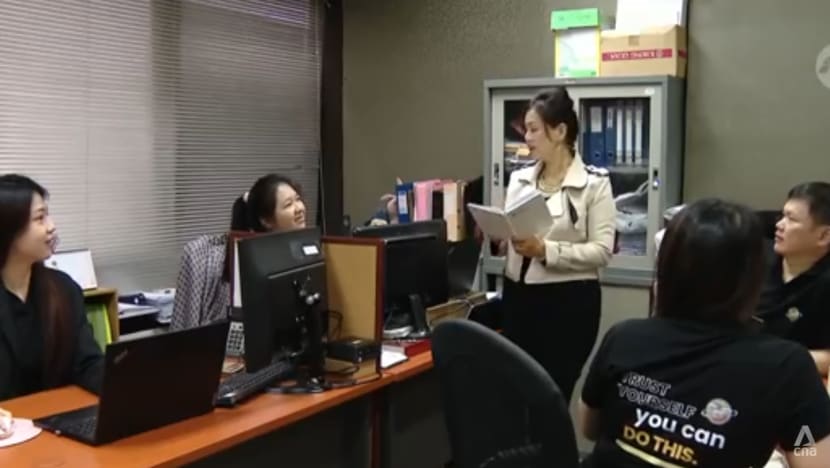Filling gaps and a too-short minimum notice: SMEs worry over extra weeks of mandated shared parental leave
SMEs are likely to struggle, especially when only one person handles a critical job function, said an HR firm director.

As the director of TnB Global Outsource, a small and medium-sized enterprise (SME) with 18 staff members, Ms Lily Tan (standing) was worried about the impact of a new shared parental leave scheme on her business.

This audio is generated by an AI tool.
SINGAPORE: At one accounting firm, the recent announcement on an additional 10 weeks of mandated shared parental leave was met with mixed emotions.
As a mother of three, Ms Lily Tan welcomed the news with open arms. But as the director of TnB Global Outsource, a small and medium-sized enterprise (SME) with 18 staff members, she was worried about the impact on her business.
"The key issues to be addressed is … workload management. We have to redesign the jobs and assign the jobs to different team members,” she told CNA.
When employees at her firm - mostly made up of women - announce their pregnancy, the firm starts preparing to fill the future gap, including through cross-department training if required, she said.
Given that work in her industry involves managing several deadlines, she was concerned that hiring staff temporarily might be disruptive.
“To train the new staff … to take over the position of the existing employee, it's going to take … three months to four months,” she said, adding that it might take longer depending on the capabilities of the hire.
Prime Minister Lawrence Wong announced in his National Day Rally speech on Sunday (Aug 18) that parents of newborns will get an extra six weeks of shared leave from Apr 1, 2025, before going up to 10 weeks a year later.
STRUGGLES OF SMEs
Ms Tan is not the only owner of an SME concerned about improved work benefits putting a strain on manpower and performance.
Their concerns are not unfounded, said Ms Juliet Tan, director of human resources (HR) firm Emplifi. SMEs are likely to struggle, especially when only one person handles a critical job function, she said.
Explaining the firms’ conundrum she asked: “If I hire a permanent employee, what happens when the other employee comes back? I will have a dual head count in the same function.
“(Even) if I want to hire a part-timer for six months, because (I have to do) my GST (goods and services tax) filing, my CPF (Central Provident Fund) filings monthly, who wants to take on a six-month contract or eight-month contract, who’s also qualified to do the job?"
Mr Ang Yuit, president of the Association of SMEs (ASME) noted that some firms may be unable to spare the time to find the replacement.
“Depending on how long the shared parental leave is, sometimes businesses would just take the (dip in) productivity or dip in performance during that period, and just tide it over … and hope that that person comes back soon, and then they continue business as usual,” he said.
Companies also noted that the minimum four weeks notice is too short for the purpose of assessing needs and making arrangements, said Mr Ang.
“We are hoping that it will be a bit longer, because four weeks doesn't give you too much time first, to understand what are the jobs that need to be taken over, and then finding the right people,” he said.
WHAT FIRMS SHOULD DO
SMEs need to get better at strengthening their manpower processes and ensuring that they define the different roles of people in their organisations, said Mr Ang.
Emplifi’s Ms Tan, who noted that SMEs can be slow to react, urged them to do a risk assessment.
“They (should) assess which are the business critical functions, which has risk in that there's only one person having all the knowledge,” she said.
“They (should) start developing SOP (standard operating procedure) and knowledge base so in the event somebody has to leave on short notice, whether it's for birth or any other reasons, there's business continuity.”
She added that a possible solution for SMEs is to redesign jobs, and adopt technology to reduce workload.
They can also ask the employee to consume their parental leave over a longer period of time, or for it to be taken in a “piecemeal” fashion - for instance, by working shorter work weeks. This would help both employers and employees, she said.
She added that the government needs to gather feedback on what is working and what is not.
Despite the concerns, SME director Lily Tan is ready to battle the problems that may arise.
“We will face these short-term business challenges, but in the long term, it will promote and increase the national fertility rate and make the workforce happier,” she said.





















